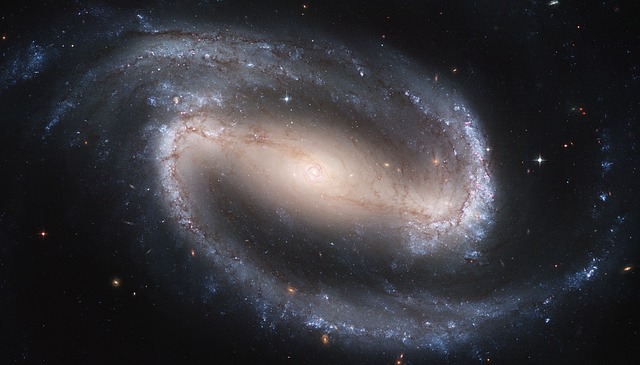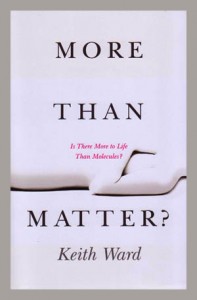I was asked to review Keith Ward’s More Than Matter: Is There More to Life Than Molecules? as part of Ian Markham’s Dean’s Discussion Day at Virginia Theological Seminary. Here’s what I had to say (or here in PDF):
**
In his book More than Matter, Keith Ward offers a conversational but thorough defense of idealism, focusing particularly on philosopher Gilbert Ryle’s critique of Cartesian dualism from his book The Concept of Mind. To put it briefly, Ryle believed Descartes to have created a myth about a “ghost in the machine,” [1] a myth in which “the mind is a separate, hidden world connected arbitrarily to the body.” [2] Professor Ward thinks this an unfair reading of Descartes and sets out, in part, to correct it. It’s worth quoting at some length a late passage that summarizes Ward’s position and demonstrates the way he chooses to consistently frame it. He writes,
When the Aristotelian philosophy was replaced by the more mechanistic approach of classical science, it became difficult for philosophers to integrate personal values and purposes into the increasingly influential world view of natural science. Cartesian dualism was one symptom of this difficulty, separating mental substance from material substance in such a way that it was difficult to see how one could interact with the other. As I have emphasized, Descartes believed in such integration, but did not find a plausible way of formulating it. It was to take the discovery of evolution to do so, with the picture it opened up of a gradually more complex and emergent process leading to the development of mind as an increasingly autonomous inner aspect of matter. [3]
So for Ward, mind and matter are separate but integrated aspects of reality. Thus he calls his position “dual-aspect” idealism, because “it stresses the importance of the material aspect as a means of allowing the potentialities of mind[, the mental aspect,] to be expressed.” [4] I was reminded in this philosophical discussion of William Temple’s theological claim about the sacramental character of the universe. Temple writes, “the order … is spirit first and spirit last, with matter as the effectual expression or symbolic instrument of spirit.” [5] So it is for Ward with matter and minds. Material reality is essential because it provides a medium in which minds can find their fullest expression. That it took, we think, billions of years for finite minds to arrive on the scene does not necessarily undermine this primacy of mind. We must allow that the intention for the development of minds has been around since the beginning. But back to that in a moment.
Ward is clear about the stakes of this argument; he believes it is part of “a major intellectual battle” with materialists over the “distinctive reality and value of human minds.” [6] His motivation derives in large part from concerns about the person. For instance, if we believe a mind is different from a brain, we must carefully account for the continuity of “experiences” and “actions” that give minds “their unique identity.” [7] And if we believe a mind is more than a sophisticated computer program, then we must account for human consciousness and moral freedom to make clear why purpose and intention belong in our metaphysical speculation even as they have been excluded, and rightly so, from scientific discourse. Indeed Ward’s ambitious goal is to develop an account that is consonant with the picture of physical reality that twentieth-century science built up without discarding the concept of mind as illusory or superfluous.
I find Ward’s picture of the individual human mind to be quite compelling. His preferred language, drawn from Whitehead, [8] of mind as inner nature that gives meaning and purpose to our lives provides an evocative and, I think, reasonably satisfactory answer to the mind-body problem. I think Ward argues that the error with Ryle’s “ghost in the machine” is essentially false analogy. The brain doesn’t throw a series of discrete mental levers to animate the body’s arms and legs; rather the mind, as inner nature of the body, simply realizes its purposes through, among other things, physical movement. If the connection is mysterious for lack of a mechanism, then so be it. Action, no less than volition, is continuous, says Ward: “The mistake is not in positing mental acts. The mistake lies in thinking of mental acts as countable, discrete episodes.” [9] We find that we simply cannot expect the concepts and language of mechanics to give adequate account of mind and body at work together; we need an integrative, not a reductive, picture.
Where I find myself in the weeds with this book is those places where we move from minds as the unseen inner nature of persons to minds as “more real than matter” [10] and as “the basic character of reality.” [11] What I appreciated about Ward’s move from microcosm to macrocosm was the argument’s analogical consistency. Consider the following passage:
Whereas an older generation of scientists and philosophers thought the universe was rather like a watch, many now regard the universe as more like an organism. It grows and develops, and its first stages can only be properly understood when its completely developed state is perceived … [C]onscious personal life and the material structure of the universe fit together in a coherent way if we suppose that the physical universe has the purpose of producing personal consciousness as the natural realization of its inherent and original capacities. [12]
So just as human minds are the natural and ultimate movers and shakers of our bodies, so a personal Cosmic Mind or Hegel’s impersonal Absolute Spirit may be at work animating the material universe toward the ultimate purpose of conscious life. The “fine-tuned” nature of universal physical constants are just one example of how the results of physical science provide some support for this view, though of course in a speculative way.
What somehow rubbed me the wrong way in this discussion was to say that all this shows that mind is more real than matter. I can understand, as he says elsewhere “more basic, more causally efficacious,” [13] given the primacy of the mental aspect over the physical in their interplay as described above. But more real seems to me to undermine that essential mutuality. I am not convinced that because minds influence reality-in-itself we should therefore create a hierarchy of realness. That seems to me to needlessly antagonize the physical scientists Ward wants to be in conversation with.
Allow me now a short digression to introduce a final thought experiment that I hope might be helpful for some. I just returned from a long weekend in Philadelphia with my oldest friend. Carl was the one who introduced me to the work of British humorist Douglas Adams, who became a shared passion and who gave us much to laugh, cry, and think about for the roughly twenty years we’ve known each other. Apparently I couldn’t finish reading More than Matter in Carl’s home without putting Ward’s ideas in concrete conversation with Adams’s famously materialist perspective. In my imagination, Adams, and sometimes his friend Richard Dawkins, play the interlocutory roles for me that Ryle, and sometimes Wittgenstein, play in the book, for Ward.
Among many possible critical apparatus from Douglas Adams’s two major literary worlds, the one that occurred to me as most relevant to Ward’s discussion is the Total Perspective Vortex, a device that appears in Adams’s novel The Restaurant at the End of the Universe. The Vortex forced its victims to see “in one instant the whole infinity of creation and [themselves] in relation to it.” [14] Adams playfully proposes that the experience would be fatal, given the utter insignificance of any individual being against so vast a cosmic backdrop.
I had to wonder what Ward’s idealist philosophy might make of the Vortex. “Space,” Adams famously writes, “is big, Really big. You just won’t believe how vastly, hugely mind-bogglingly big it is.” [15] And so of course the Vortex is a bit demoralizing, because the seven octillion atoms, roughly 10^28, in one human being [16] still make for a puny numerator when dividing by, say, 10^82, the high end of the estimate of the number of atoms in the known universe. [17] Any individual is a zero in such a framework, but idealism tells us that this materialist calculus is all wrong. A snapshot of the intergalactic night sky, however detailed, can never offer Total Perspective if we believe that all we see is not all there is.
If matter is not all of what there is, not all of who we are, then our relative size in the snapshot changes. Ward writes, “We should not think that it took the birth and death of millions of star-systems and the extermination of millions of extinct organisms just to produce one man drinking beer in a pub. However, in one sense that man is more valuable than all those galaxies, because there was no one to appreciate their beauty, whereas at least he enjoys his pint.” [18] So an idealist Total Perspective Vortex might well weight an individual’s significance by his or her ability to realize the universal purposes of consciousness, beauty, love, and maybe sacrifice, and to continue their development. Thus, the little “you are here” dot grows, becoming bigger than the sum of our body parts. Ward again: “We may think we exist on the last half-page of the many-volume book that is the history of the universe. But if there are even more volumes still to come, that changes the picture entirely.” [19]
As I worked through Ward’s final chapters and particularly his discussion of the arts, I came to believe that a true Total Perspective Vortex would of necessity be a multimedia experience to come anywhere close to capturing the cosmic significance of the lives of even the most boring among us. Our ability not just to appreciate but to create in the worlds of poetry and music, mathematics and ethics, would need to be reflected in some cinematic symphony. I was reminded then of another Douglas Adams scene, a fantastical encounter in which an electronic musician is suddenly surrounded by what he can only describe as “the music of life itself” (spoiler alert: it turns out to sound a lot like Bach). [20] The musician later says “I’m not religious, but if I were I would say it was like a glimpse into the mind of God. Perhaps it was and I ought to be religious.” [21] Perhaps it’s unfair for me to call my favorite writer a materialist after all. And perhaps it’s fair for Ward to call creative minds, and the Creator whose purposes they realize, the realest things we know of—at least for now.
- All footnotes from Ward give the approximate Amazon Kindle “location” of the excerpt (out of 3329 total locations). Keith Ward, More than Matter? [Kindle Edition] (Oxford: Lion Books, 2011): 80.
- Ward, 1638.
- Ward, 3015.
- Ward, 1335.
- William Temple, Nature, Man and God (London: Macmillan and Co, 1934): 492.
- Ward, 115.
- Ward, 913.
- Ward, 1182.
- Ward, 2177.
- Ward, 509.
- Ward, 810.
- Ward, 1196 & 1269.
- Ward, 1982.
- In Douglas Adams, The Ultimate Hitchhiker’s Guide to the Galaxy (New York: Ballantine, 2002): 198.
- Hitchhiker’s, 53.
- Brian Clegg, “20 amazing facts about the human body,” The Guardian (26 January 2013): http://www.theguardian.com/science/2013/jan/27/20-human-body-facts-science
- John Carl Villanueva, “Atoms in the Universe,” Universe Today (30 July 2009): http://www.universetoday.com/36302/atoms-in-the-universe/
- Ward, 1302.
- Ward, 1316.
- Douglas Adams, Dirk Gently’s Holistic Detective Agency (New York: Pocket, 1987): 290.
- Dirk Gently, 298.

